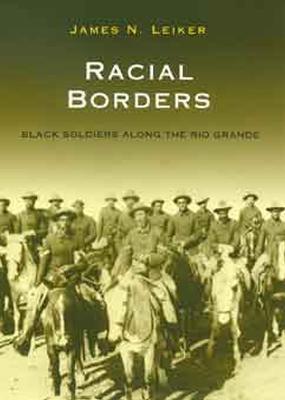Racial Borders: Black Soldiers Along the Rio Grande

Racial Borders: Black Soldiers Along the Rio Grande
When the Civil War ended, hundreds of African Americans enlisted in the U.S. Army to gain social mobility and regular paychecks. Stationed in the West prior to 1898, these black soldiers protected white communities, forced Native Americans onto government reservations, patrolled the Mexican border, and broke up labor disputes in mining areas. African American men, themselves no strangers to persecution, aided the subjugation of Indian and Hispanic peoples throughout the West. It can hardly be surprising, then, that the relations among these groups became complex and often hostile-hardly surprising, but rarely examined. Despised by the white settlers they protected, many black soldiers were sent to posts along the Texas-Mexico border-- perceived to be a "safe place to put them." The interactions there among blacks, whites, and Hispanics during the period leading up to the Punitive Expedition and World War I offer the opportunity to study the complicated, even paradoxical nature of American race relations. James N. Leiker has applied the sophisticated perspectives of new social history to the experience of the buffalo soldiers and their legacy in southern and western Texas in an effort to gain new insight about race in the West. Racial Borders establishes the army's fundamental role in transforming the Rio Grande from a "frontier" into a "border" and shows how that transformation itself brought a tightening of racial and national categories. But more importantly, it warns about the dangers of simplifying history into groupings of "white and non-white," "oppressors and oppressed." Leiker draws on Mexican and U.S. military records and Texas state and black national newspapers to do more than provide an account of the shifting loyalties of race and nationalism along the Rio Grande over a fifty-year span; he reminds scholars and reformers about the tangled history of race relations in America.
PRP: 175.23 Lei
Acesta este Prețul Recomandat de Producător. Prețul de vânzare al produsului este afișat mai jos.
157.71Lei
157.71Lei
175.23 LeiIndisponibil
Descrierea produsului
When the Civil War ended, hundreds of African Americans enlisted in the U.S. Army to gain social mobility and regular paychecks. Stationed in the West prior to 1898, these black soldiers protected white communities, forced Native Americans onto government reservations, patrolled the Mexican border, and broke up labor disputes in mining areas. African American men, themselves no strangers to persecution, aided the subjugation of Indian and Hispanic peoples throughout the West. It can hardly be surprising, then, that the relations among these groups became complex and often hostile-hardly surprising, but rarely examined. Despised by the white settlers they protected, many black soldiers were sent to posts along the Texas-Mexico border-- perceived to be a "safe place to put them." The interactions there among blacks, whites, and Hispanics during the period leading up to the Punitive Expedition and World War I offer the opportunity to study the complicated, even paradoxical nature of American race relations. James N. Leiker has applied the sophisticated perspectives of new social history to the experience of the buffalo soldiers and their legacy in southern and western Texas in an effort to gain new insight about race in the West. Racial Borders establishes the army's fundamental role in transforming the Rio Grande from a "frontier" into a "border" and shows how that transformation itself brought a tightening of racial and national categories. But more importantly, it warns about the dangers of simplifying history into groupings of "white and non-white," "oppressors and oppressed." Leiker draws on Mexican and U.S. military records and Texas state and black national newspapers to do more than provide an account of the shifting loyalties of race and nationalism along the Rio Grande over a fifty-year span; he reminds scholars and reformers about the tangled history of race relations in America.
Detaliile produsului










